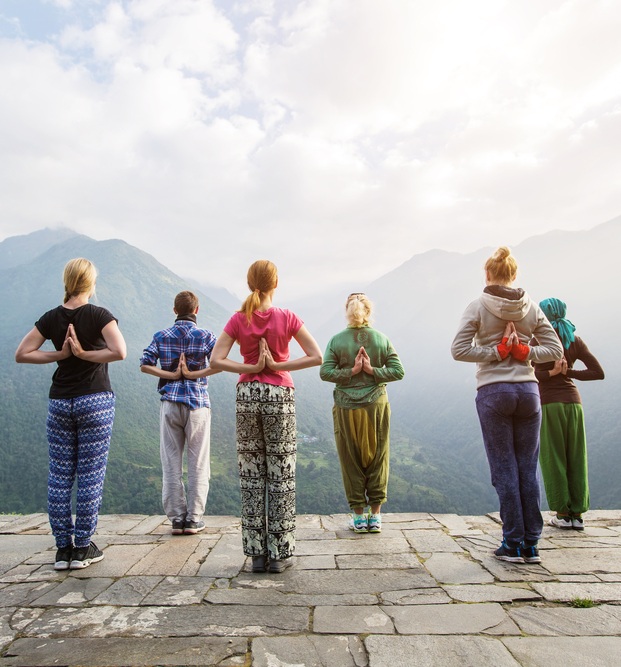Have you tried yoga yet?
Have you noticed how many yoga classes are available in gyms, health clubs and community centres near you? Increasing numbers of people of all ages and abilities are attending classes, and many of them are looking for more than just a fitness regime…. They’re hoping that yoga will be able to relieve all sorts of physical and mental health issues that conventional treatments haven’t been able to resolve.
What is yoga?
Yoga originated in ancient India. It is a collection of physical, mental and spiritual techniques that are rooted in Buddhism, Jainism and Hinduism, and are intended to help followers achieve control over their mind and body, achieve their goals, and achieve inner peace and enlightenment.
Yoga became a popular form of exercise in the West during the 1980’s by focusing on breathing, movement, and posture to build strength and flexibility and boost physical and mental wellbeing. Maintaining steady breathing while doing yoga poses improves posture, increases lung capacity, strengthens joints, increases flexibility, reduces blood pressure, and improves balance and coordination.
Is it safe?
Dozens of scientific trials have been published on yoga, and the vast majority have concluded that it’s a safe and effective way to help tackle a range of health issues. However, if you have any pre-existing health conditions it’s important to check with your doctor first, to insure it’s suitable for you.
Are there different types of yoga?
There are several different styles of yoga, such as Hatha, Ashtanga, Iyengar and Sivananda. Some are more vigorous than others, while some may have a different area of emphasis, such as stretching, posture, or breathing. Many yoga teachers develop their own style by studying more than one type, so be careful to talk to the teacher before signing up to a class, and make sure it’s appropriate for your fitness level. You should also check that the teacher is insured and holds a teaching certificate and accreditation from a yoga association.
Can yoga help reduce anxiety and depression?
Yes, an analysis of 12 randomized controlled trials of yoga for clinical depression reported that yoga was significantly better than usual care, relaxation exercises, or aerobic exercise in decreasing depressive symptoms. See the full report here:
There are several possible mechanisms by which yoga might have an impact on depression or anxiety. In a yoga class the student is obliged to pay attention to the here and now in order to correctly complete each pose, rather than ruminating on the past or worrying about the future. Focusing on the present also teaches students that thoughts and feelings are transient mental events, and that negative (and positive) feelings will fluctuate and change. Yoga-based practices may also help regulate the autonomic nervous system, and modify underactivity of the parasympathetic nervous system, both of which can improve mood.
Can yoga help relieve pain?
Yes, controlled stretching and breathing techniques relieve muscular tension and promote relaxation, and developing good posture strengthens muscles and addresses pain caused by years of poor deportment.
A small study carried out at the University of Utah (USA) provided some insight into the effect of yoga on pain tolerance. Their subjects were 12 experienced yoga practitioners, 14 people with fibromyalgia (a condition many researchers consider a stress-related illness that is characterized by hypersensitivity to pain), and 16 healthy volunteers. When the three groups were subjected to thumbnail pressure, the participants with fibromyalgia - as expected - perceived pain at lower pressure levels compared with the other subjects. Functional MRIs showed they also had the greatest activity in areas of the brain associated with the pain response. In contrast, the yoga practitioners had the highest pain tolerance and lowest pain-related brain activity during the MRI. The study highlights the value of techniques such as yoga, that can help a person regulate their pain responses.
Can yoga help treat migraines?
Specific yoga poses can target tension and stress which may be contributing to migraines, and certain poses can help boost circulation and improve blood flow to the brain, which can lessen pain or throbbing sensations.
Research indicates that practicing yoga in addition to conventional treatments, is effective in decreasing the frequency and intensity of migraines and the associated autonomic symptoms such as nausea, vomiting and diarrhoea. See the full report here:
Can I practice yoga at home?
Yes, there are some excellent training videos for beginners on YouTube, here are just a couple: Yoga with Adriene here: and SaraBeth Yoga here:
What is a yoga retreat?
It’s something I’ve often thought about doing, but haven’t got round to yet. As well as daily yoga classes, a vacation at a yoga retreat enables participants to delve more deeply into devotional practices such as mantra chanting, philosophy, and karma yoga (community service) that are part and parcel of yoga in the East.Most retreats will focus on one type of yoga; Anusara for newbies, Bikram for weight loss, Jivamukti for traditionalists, and Ashtanga for cardio lovers.
Yoga retreats don’t necessarily come cheap, and it can be difficult to choose wisely, so here are five that are situated in India that are considered to be good value, and will give you an idea of what’s available;
yogagoa.com: Open from mid-October to late April. Full-board is £590/£890 for one/two weeks in a shared room, or £750/£1,100 in a single room.
kdham.com: Open all year. £42 a week for yoga with naturopathy; £115 a week for yoga with Ayurvedic treatment. Accommodation starts at £67 a week for a shared room and goes up to £425 for a cottage.
phoolchattiyoga.com: Open February-May & September-December. The seven-day course is £110, including accommodation in a shared room, all yoga classes and three meals.
iyengaryoga.in: Classes run from October to May. One week (beginners) is £11; one week (general) £16; accommodation in the ashram from £6-£9 per night.
hiyogacentre.com: Dharamkot open mid-February to late October; Arambol from November to end of March. Five-day courses start at £42 (accommodation extra).
Have you been to a yoga retreat?
If so, please share your experiences and photos.
Thank you for reading this blog post, if you have any ideas for future posts, please do let me know. I would love to hear from you - contact me.



